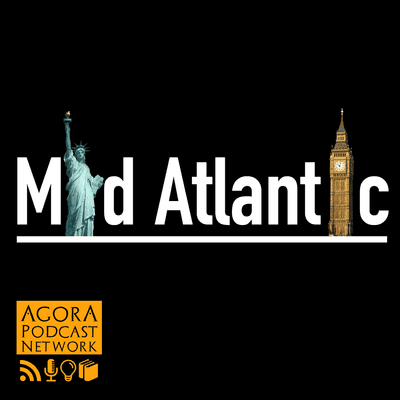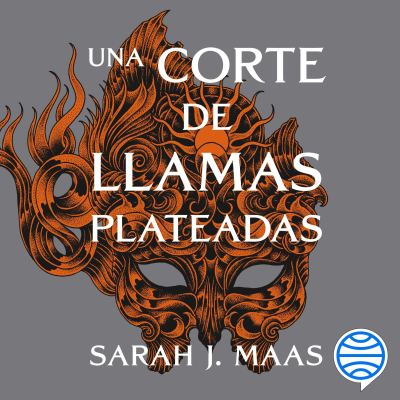
Mid-Atlantic - conversations about US, UK and world politics
Podcast de Roifield Brown
Chit chat and debate about politics and culture in the US and UK, with Host Roifield Brown and guests. Hosted on Acast. See acast.com/privacy for more information.
Disfruta 90 días gratis
4,99 € / mes después de la prueba.Cancela cuando quieras.
Todos los episodios
334 episodiosThis week’s Mid-Atlantic served up a blistering transatlantic roundup, with host Roifield Brown and a sharp panel of commentators dissecting political dysfunction from the White House to Westminster. First, Elon Musk’s abrupt departure from the Trump administration drew collective side-eye. Denise Hamilton called it a “planned grift,” while Michael Donahue reminded us Musk’s firms are still swimming in government contracts. As for public perception? Let’s just say Tesla’s aura now smells a lot like diesel. Next, Trump’s vendetta against Harvard and foreign students provoked righteous fury. Michael labelled it “vindictive chaos,” while Denise broke down how this could gut America’s soft power for decades. Meanwhile, Cory Bernard coolly suggested British universities may opportunistically benefit from Trump’s xenophobic overreach. A win for Oxford, a loss for everyone else. On the UK side, Labour’s Brexit “reset” is, according to Cory, “technocratic fudge.” While the EU quietly standardises global regulation, Britain remains a rule-taker masquerading as a rule-maker. The panel skewered Starmer’s “quiet alignment” approach, calling it necessary but cowardly. Gaza and the UK’s too-little-too-late condemnation of Israeli settlements brought a sombre close, with Denise lamenting performative outrage after the damage is done. Oh, and Trump’s tariffs? Illegal, inflationary, and economically suicidal—now rubber-stamped as such by the courts. Selected Quotes from the Episode 1. “This is just a three-card monte. You’re looking over here, meanwhile, you’re being robbed mercilessly.” – Denise Hamilton 2. “You can’t run a country like a business because government’s job isn’t to make money—it’s to deliver the mail and send checks to old people.” – Michael Donahue 3. “The UK’s condemnation is just performative. Now that Gaza’s flattened, suddenly everyone finds their moral compass.” – Cory Bernard 4. “We are experiencing a level of grift we can’t even process.” – Denise Hamilton 5. “The EU is stealthily rewriting global corporate governance—and Britain is just cosplaying sovereignty.” – Roifield Brown ---------------------------------------- Hosted on Acast. See acast.com/privacy [https://acast.com/privacy] for more information.
British politics post-local elections resembles less a democracy in action and more a therapy session with occasional shouting. In this episode of Mid-Atlantic, the panel tears into the latest electoral results, with Reform UK bulldozing their way through local councils, Labour sleepwalking through governance, and the Tories doing their best impression of a political hospice. Dave Smith kicks things off with a cold, hard look at Reform UK’s momentum. With council control and a surprise mayoral win in Lincolnshire, Reform is no longer on the fringes. Smith calls them a “galvanising force for the working class,” prompting an awkward reckoning from the left. Labour, once the natural home for these voters, is now seen as distant, managerial, and uninspiring. Steve O’Neill admits his past support for Labour’s “do nothing and hope” Ming vase strategy was misplaced—an understatement. Tonye Altrade and Leah Brown grapple with Labour’s post-landslide hangover. Starmer’s white paper on immigration is dissected not just for its policies but for the gaping hole where vision should be. It's tough to sell a national direction when no one can tell what lane you’re driving in. Leah Brown underlines the real crisis: Labour may be governing, but Reform is winning the emotional war by peddling a message of hope, however dubious the details. The Tories, according to Brown, are in survival mode. Talk of new leadership is already swirling, with Kemi Badenoch eyed as the phoenix to rise from electoral ashes. But internal division and reformist flirtations risk turning the party into political mulch. Meanwhile, the Lib Dems are cheerfully slicing up the Tory carcass in the South West and beyond. Steve O’Neill calls it “vibes-based campaigning,” and frankly, it's working. While Reform is tapping into disillusionment and Labour fumbles the bag it just won, the Lib Dems are slowly, quietly positioning themselves as the adults in the room—if only anyone knew who Ed Davey was. 5 Quotes from the Episode 1. “It's still like being crowned the tallest dwarf.” – on Lib Dems’ electoral wins. 2. “Populism doesn’t equate to good governance.” – Leah Brown 3. “Labour basically ran on being ‘not the Tories’. Now Reform is running on being ‘not Labour’.” – Dave Smith 4. “Starmer behind a lectern won't fix Britain's sinking ship. He needs to be laying bricks on a building site.” – Royfield Brown 5. “We knew what the last Tory government said it stood for. I have no idea what this one does.” – Steve O’Neill ---------------------------------------- Hosted on Acast. See acast.com/privacy [https://acast.com/privacy] for more information.
In this post-election special of Mid-Atlantic, host Roifield Brown and Canadian political analyst Adam Schaan break down what might be the most consequential Canadian election in recent memory—not just for the results, but for what they signal about the country’s identity. In a week where Donald Trump’s bombastic threats of annexation echoed from below the 49th parallel, Canada’s electorate responded with an unmistakable rejection of populist rhetoric, economic fearmongering, and American political toxicity. Mark Carney’s Liberal Party managed to claw its way back into minority power, with 169 seats and 43.7% of the vote, largely thanks to a generational divide and the NDP’s collapse. While Pierre Poilievre’s Conservatives posted their strongest popular vote showing since 1988, a loss of his own riding and a perception problem with key demographics (read: older voters and women) left the party licking its wounds. The NDP, Greens, and Bloc all bled support, caught in the crossfire of a campaign where sovereignty and survival overshadowed ideology. Adam Schaan, fueled by cigarettes and sheer political obsession, paints a picture of a fractured federation temporarily glued together by a fear of becoming the 51st state. Whether unity can hold, and whether Carney truly walks the walk of humility and coalition-building, remains to be seen. But one thing’s clear: Canada is reasserting its independence not with sabres, but with ballots. ---------------------------------------- Hosted on Acast. See acast.com/privacy [https://acast.com/privacy] for more information.
In Washington, a rare flicker of institutional resistance is lighting up the political gloom. As the Supreme Court sides 7-2 against mass deportations and Harvard takes legal aim at executive power, Roifield Brown and his panel ask the awkward but necessary question: Is the American Republic finally growing a spine? Panelists Denise Hamilton and Mike Donahue agree that while Trump’s pressure tactics aren’t new, the scale of legal and educational defiance certainly is. Meanwhile, they also highlight the existential threat: America’s fragmented information ecosystems mean citizens no longer even start from the same facts, making any comeback for democratic norms a grinding uphill struggle. Across the Atlantic, a different kind of existential crisis unfolds. Robert Jenrick, already measuring the curtains for Tory leadership, hints at a tactical realignment between the Conservative Party and Reform UK. Cory Bernard and Steve O’Neill dissect the fine line between electoral pragmatism and political self-destruction. They warn that while Britain’s political history favours the Conservative Party's survival, wealth inequality and voter volatility could easily tear up the rulebook. Roy Field, clearly unimpressed by complacency, reminds everyone that assuming Britain’s institutions are immune to collapse is dangerously naive. The panel closes with a lighter moment: each guest picks a hometown hero worthy of a street name. Harriet Tubman, Jackie Robinson, and Clement Attlee are among the choices, though Steve O’Neill’s initial bid for "Roger Federer Street" suggests some people should stay away from naming contests. Throughout the episode, the tone is bracing: whether it's executive overreach in the U.S. or far-right drift in the U.K., democracy’s defenders will need a lot more than nostalgia and wishful thinking to hold the line. 5 SELECTED QUOTES: * “I think what we're seeing is a stiffening of the spine and a bigger commitment to holding up our institutions.” — Denise Hamilton * “It’s not left versus right anymore — it’s institutions versus chaos.” — Roifield Brown * “You can't rationalize with people who aren't working with the same facts.” — Mike Donahue * “Britain's political history doesn't guarantee immunity from collapse.” — Roifield Brown * “One street at a time, we still get to choose who we celebrate.” — Denise Hamilton ---------------------------------------- Hosted on Acast. See acast.com/privacy [https://acast.com/privacy] for more information.
This week on Mid-Atlantic, Roifield Brown hosts a packed panel to break down Donald Trump's latest economic gamble: a 10% blanket import tariff and steeper levies on select countries, with China squarely in the crosshairs. The result? Global market chaos, retaliatory threats, and international alarm bells over the US’s role in the rules-based economic order. Joining from across the Atlantic and the US are Logan Phillips in D.C., Michael Donahue in L.A., and Cory Bernard in Manchester. The panel weighs whether the tariff plan is part of a coherent economic strategy or just political theatre aimed at riling up Trump's base — spoiler: coherence is not in attendance. More than just a trade war, this marks a serious erosion of trust in the US as a trading partner. The dollar might be strong, but America's brand value? Not so much. The second half turns sharply towards the UK's options in a world where the US is a geopolitical liability. Roifield pitches a Commonwealth-centric economic bloc as a post-Brexit survival strategy — cue a full-on diplomatic skirmish. What follows is a clash of economic realism, nostalgia, and pride as the panel debates whether Britain should grovel, realign, or get louder. Yes, tempers flare. And yes, someone gets called Neville Chamberlain. Five Standout Quotes: 1. “This was not Team Trump’s best moment. It’s like trying to put out a fire with gasoline.” – Logan Phillips 2. “If you know tariffs are coming and then vanishing, there’s billions to be made — and lost. That’s terrifying.” – Michael Donahue 3. “Brand America just took a six-trillion-dollar hit. But it’s the trust deficit that really stings.” – Roifield Brown 4. “Trump won’t lose his base until their wallets feel it. If they can’t feed their families, that’s the break.” – Cory Bernard 5. “I’m not giving away the Sudetenland — I’m trying to build a coalition against economic lunacy.” – Roifield Brown ---------------------------------------- Hosted on Acast. See acast.com/privacy [https://acast.com/privacy] for more information.
Disfruta 90 días gratis
4,99 € / mes después de la prueba.Cancela cuando quieras.
Podcasts exclusivos
Sin anuncios
Podcast gratuitos
Audiolibros
20 horas / mes



















